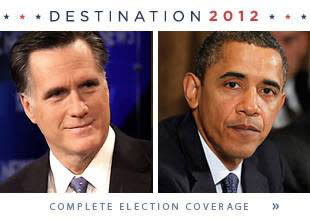Why Obama’s attack on Gov. Romney won’t prevent President Romney
Mark it as the least surprising aspect of the election: a $10 million ad buy on behalf of President Barack Obama’s re-election campaign, spread over eight battleground states, that seeks to undercut Mitt Romney’s key claim to the presidency.
“I speak the language of business,” we see and hear Romney saying. “I know how jobs are created.”
The words come from Romney’s 2002 campaign for governor of Massachusetts. Then come a barrage of charges: 40,000 manufacturing jobs gone; the state plummeting to 47th in job growth; jobs outsourced to India; $2.2 billion more in debt. “We’ve heard it all before,” the ad concludes.
Indeed we have. With the return of a governor-as-presidential nominee–2008 was the first time since 1972 without a nominee who had served as the chief executive of a state–we are hearing once again the opposition argument that the nominee’s performance as governor proves he is unfit for the White House. This is a tactic that has undergone a curious evolution, and one whose track record is decidedly checkered.
In 1976, Gerald Ford’s campaign had to run against two ex-governors: Ronald Reagan in the primaries, Jimmy Carter in the fall. In both cases, the Ford campaign aimed less at the records of the men than at their reliability.
The anti-Reagan message could not have been blunter. “When you vote Tuesday, remember,” an ad pointedly noted. “Governor Reagan couldn’t start a war–President Reagan could.”
[Related: Romney pushed individual mandate in Mass.]
In the fall, Ford’s campaign featured a “person-in-the-street” commercial with Democrats explaining their choice. One of them noted that “I’m from Atlanta Georgia. ... Two months ago I’d have voted for Jimmy Carter; the more I know about Jimmy Carter, the less I think I’ll vote for him.” Another, of uncertain provenance, said, “Carter is embarrassing me quite a bit with the way he’s opening up his mouth lately.”
Four years later, it was Carter’s turn to employ the “person-in-the-street” approach against Reagan, but this time, each speaker was identified by a city: Fresno, Sacramento, Los Angeles, San Francisco.
“Two men are the real contenders for the presidency today,” the announcer intoned. “The people of California remember one of them quite well.”
What they didn’t remember, however, is anything about Reagan’s eight years as governor. Instead, they talked about how dangerous and ill-suited for the Oval Office he was.
“I can’t imagine him as president; it’s too complex a job,” a woman said.
“Ronald Reagan is not a man I would want to lead our country for any period of time,” said another.
“He probably would have gotten us into a war by this time,” a third chimes in.
And in case you didn’t get the point, another says, “Reagan scares me; he really scares me.”
It was Michael Dukakis in 1988 who earned the dubious honor of becoming the first presidential nominee attacked on the specifics of his actual record as governor–because he had campaigned celebrating “the Massachusetts Miracle” of a booming economy. The campaign of George H.W. Bush aimed at different targets. One ad, simply labeled “The Harbor,” showed a foul, toxic body of water—“Boston Harbor, the dirtiest harbor in America”–that “will cost residents $6 billion to clean.”
“And,” the ad concluded, “Michael Dukakis promises to do for America what he’s done for Massachusetts.”
Dukakis’ record on crime was, of course, at the heart of the attacks on his candidacy. The “revolving door” commercial, with actor-convicts moving in and out of a prison yard, cataloged Dukakis’ sins: he vetoed the death penalty and mandatory sentences for drug dealers; gave furloughs to convicted murderers. “Now Michael Dukakis says he wants to do for America what he’s done for Massachusetts,” the ad stated. “America can’t afford that risk.”
(The “Willie Horton” ad, featuring a menacing mug shot of a convict who had terrorized a family while on a weekend furlough, was not produced by the Bush campaign, and Bush’s ad chief, Roger Ailes, will swear on Bill O’Reilly’s ratings that he had nothing to do with that commercial.)
[Related: Nancy Reagan endorses Romney]
The Bush campaign against Dukakis stands as the only fall presidential campaign in which an attack on an opponent’s record as governor proved effective. Look at two more recent attempts and the reason becomes clear.
In 1992, Bush’s re-election effort used the same tactic it had used in ’88–indeed, some of the same language–to go after Arkansas Gov. Bill Clinton. One memorable ad showed gloomy, black and white images of a landscape that had apparently suffered some sort of devastating disaster–which led to the ad being nicknamed “Nuclear Winter.”
The sound of a mournful wind could be heard as the announcer said: “In his 12 years as governor, Bill Clinton has doubled his state’s debt, doubled government spending and signed the largest tax increase in his state’s history. Yet his state remains the 45th worst in which to work, the 45th worst for children. … And now Bill Clinton wants to do for America what he’s done for Arkansas. America can’t take that risk.”

And in 2000? Consider an ad the Gore campaign ran in Ohio: “George W. Bush wants to bring his Texas ideas to Ohio.” But manufacturing workers in Texas are the eighth-worst paid in America; Ohio’s are the fourth-best paid. And Texas went from the 29th-worst to the 48th-worst place to raise a child under Bush. “On Nov. 7th, is that the change we really want for Ohio?”
Why were the attacks on Dukakis uniquely successful? Because they were visceral: filthy, unsafe water; violent criminals left to roam free on weekends. In contrast, the attacks on Clinton and Bush were awash in mind-numbing statistics that made no emotional connection to the voter.
Now look again at the Obama ad about Romney’s record as governor. Do you see a viscerally powerful punch?
Me neither.



